牛津英语2012年中考一轮复习 课件7A Unit 1
文档属性
| 名称 | 牛津英语2012年中考一轮复习 课件7A Unit 1 |
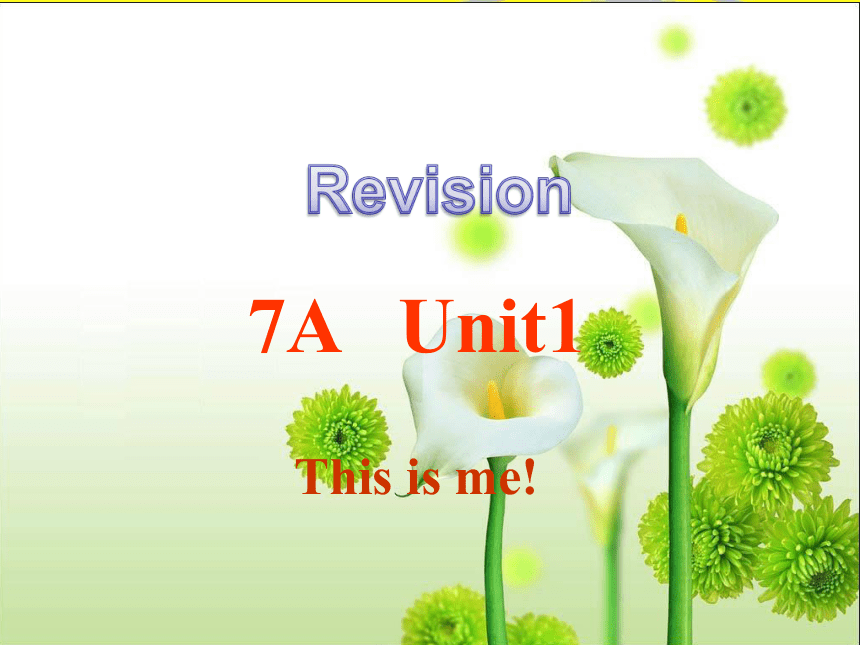
|
|
| 格式 | zip | ||
| 文件大小 | 697.2KB | ||
| 资源类型 | 教案 | ||
| 版本资源 | 通用版 | ||
| 科目 | 英语 | ||
| 更新时间 | 2012-05-26 00:00:00 | ||
图片预览

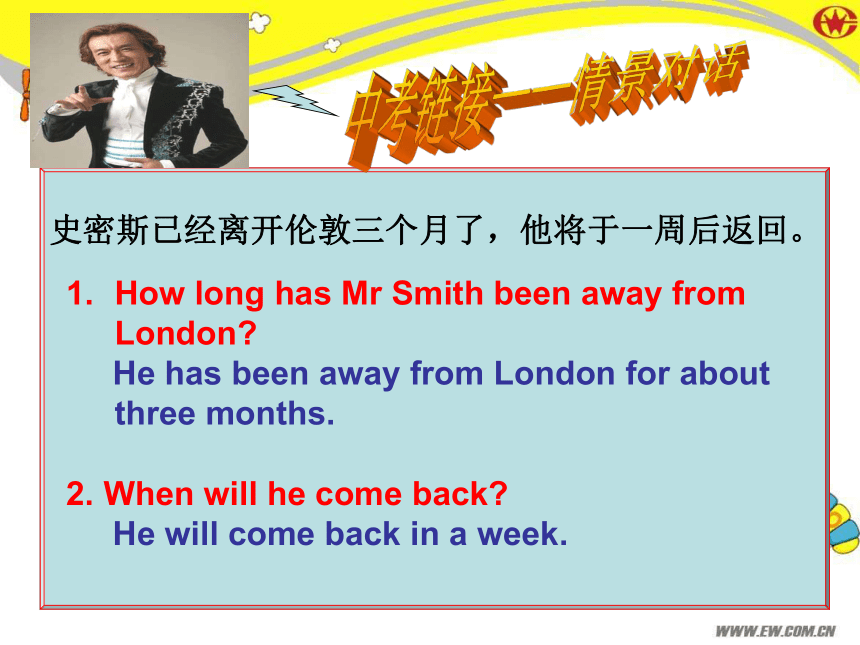
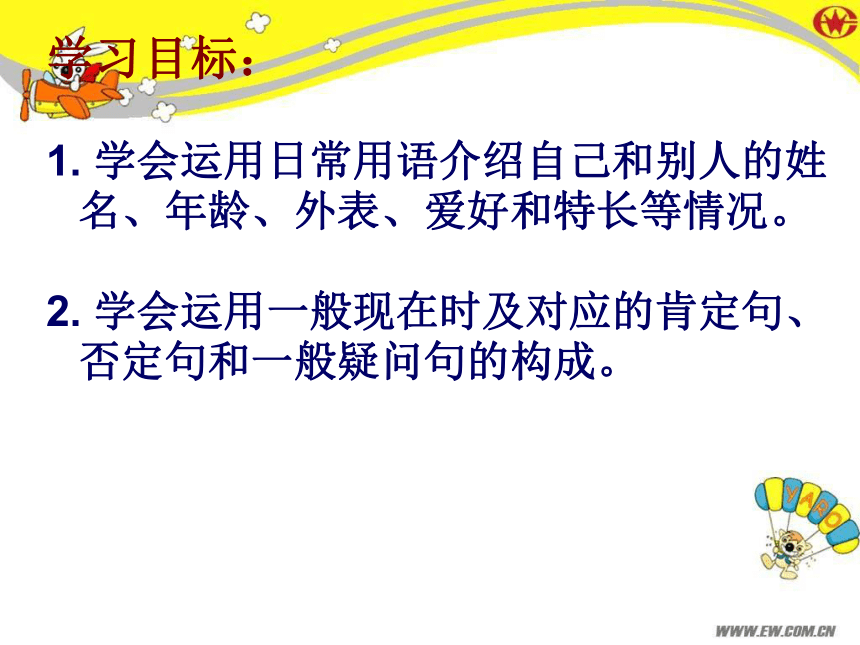
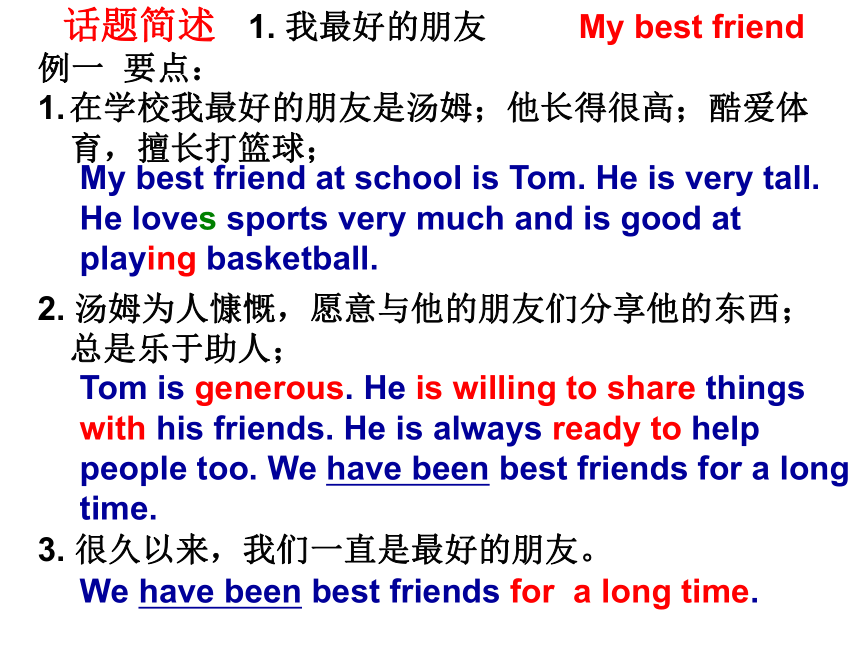
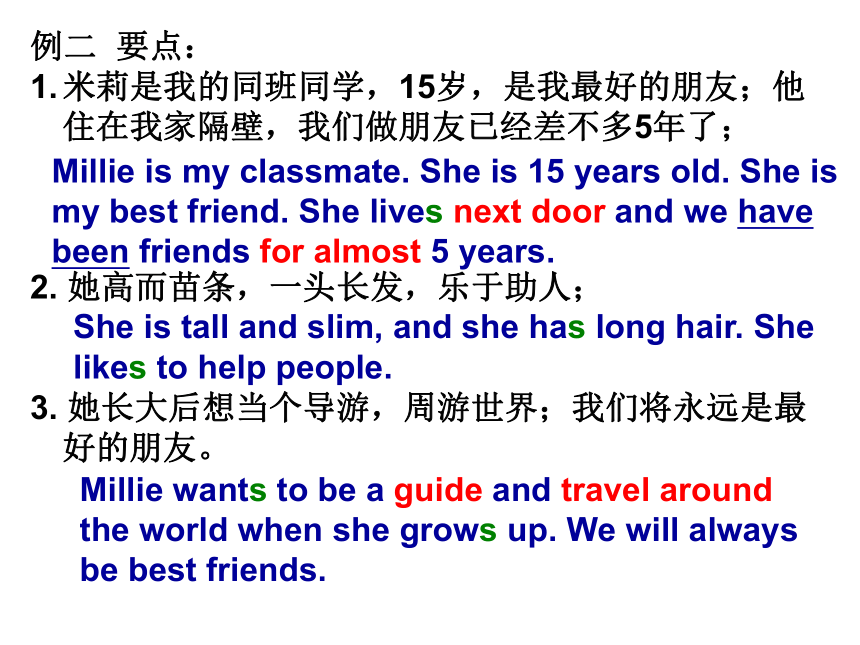
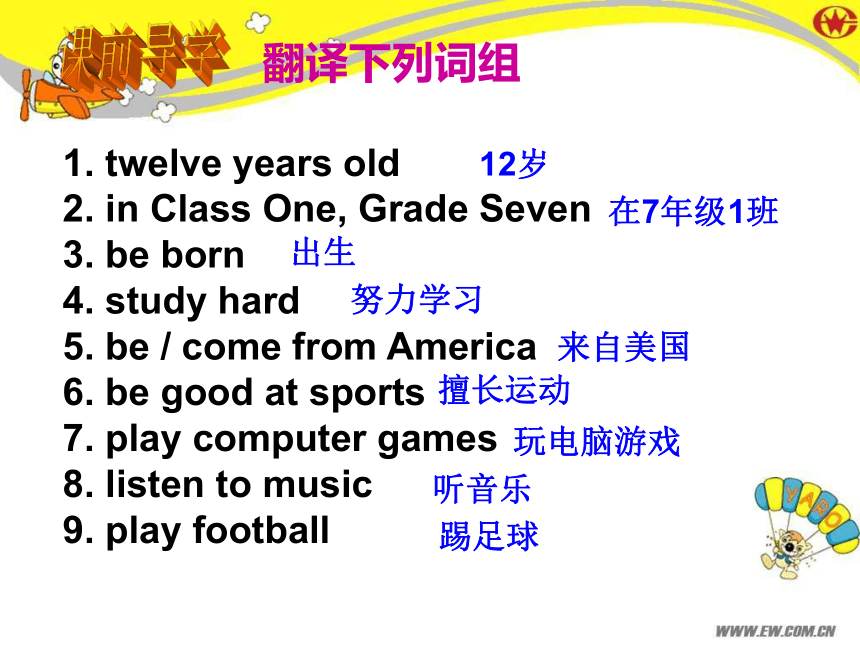
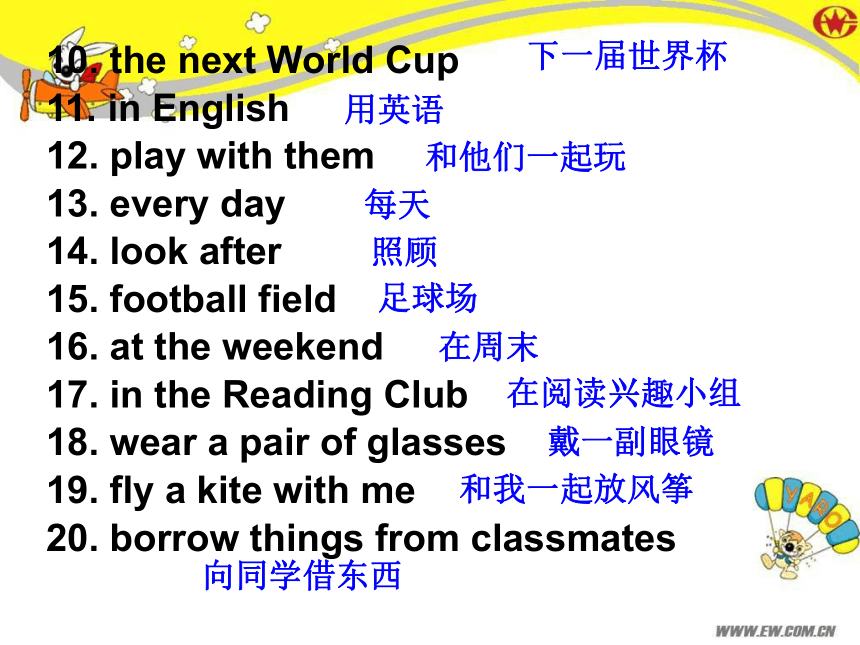
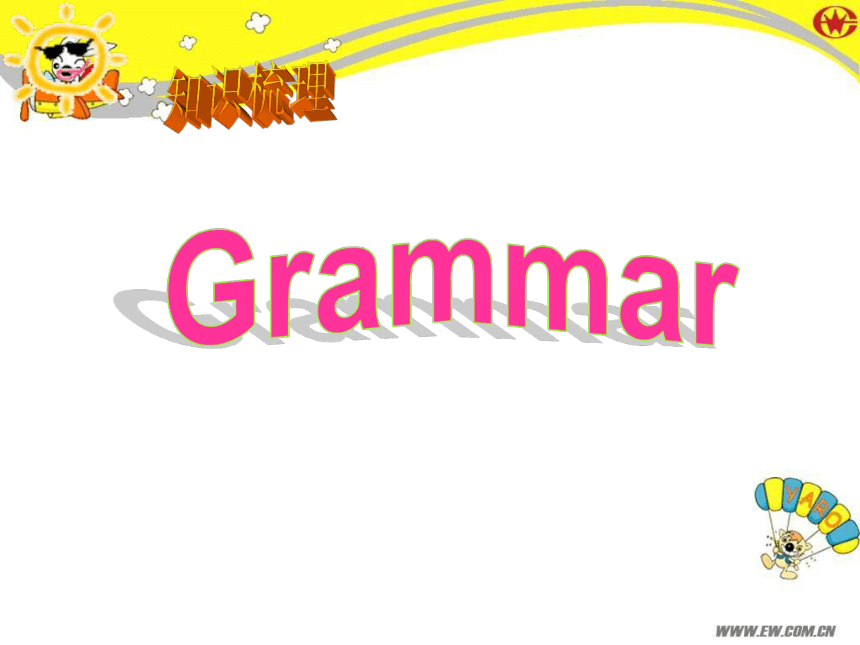
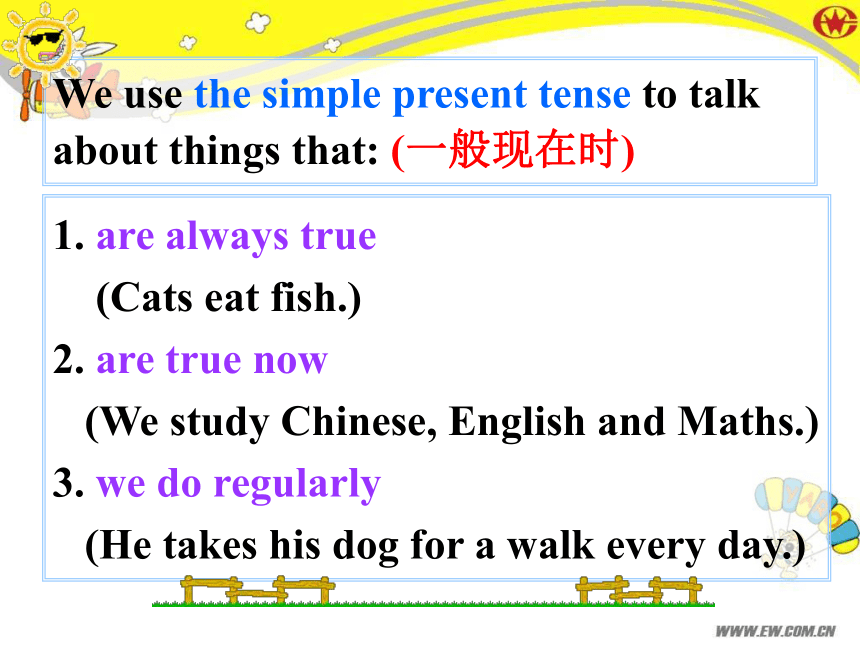
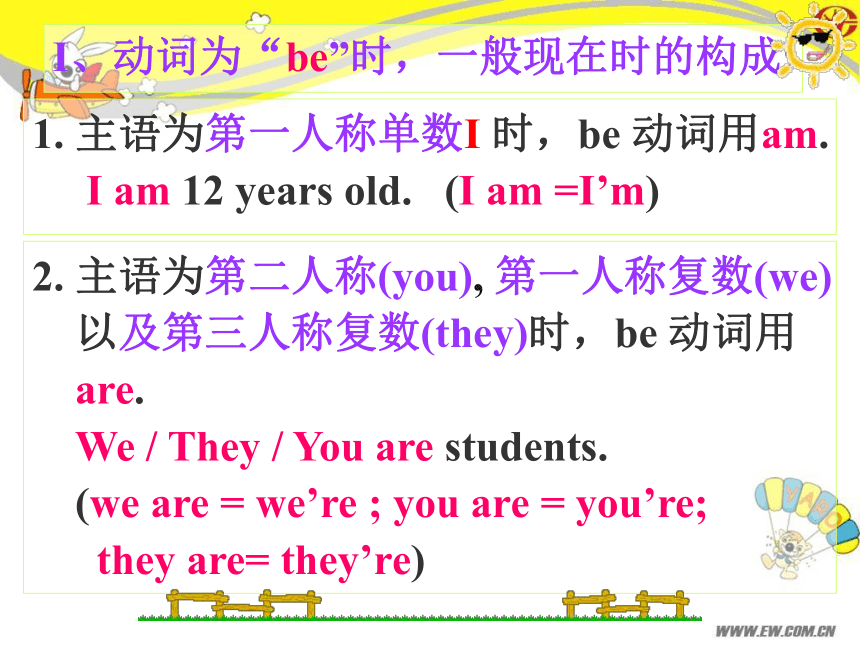
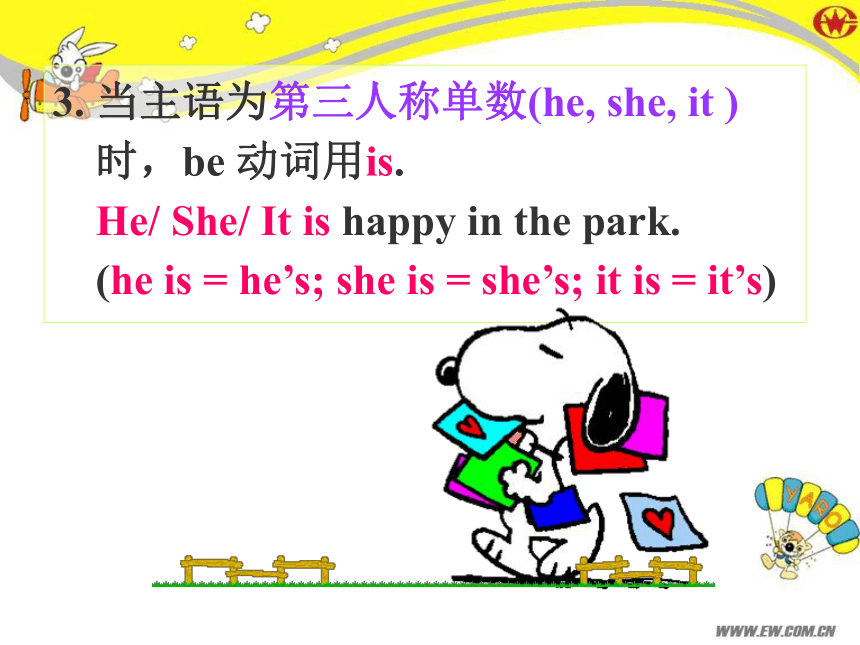
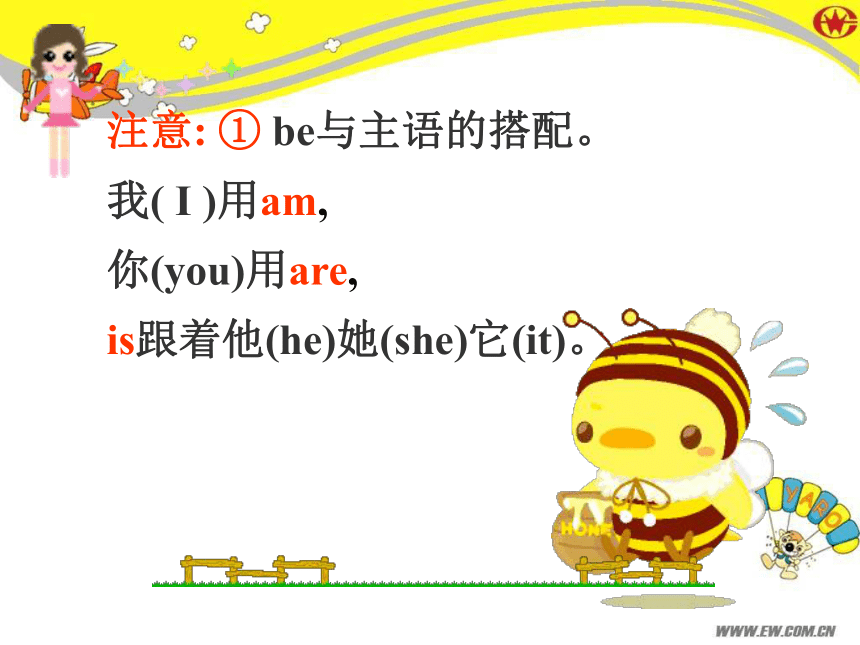
文档简介
(共36张PPT)
7A Unit1
This is me!
史密斯已经离开伦敦三个月了,他将于一周后返回。
How long has Mr Smith been away from London
He has been away from London for about three months.
2. When will he come back
He will come back in a week.
学习目标:
1. 学会运用日常用语介绍自己和别人的姓名、年龄、外表、爱好和特长等情况。
2. 学会运用一般现在时及对应的肯定句、否定句和一般疑问句的构成。
话题简述 1. 我最好的朋友 My best friend
例一 要点:
在学校我最好的朋友是汤姆;他长得很高;酷爱体育,擅长打篮球;
2. 汤姆为人慷慨,愿意与他的朋友们分享他的东西;总是乐于助人;
3. 很久以来,我们一直是最好的朋友。
My best friend at school is Tom. He is very tall. He loves sports very much and is good at playing basketball.
Tom is generous. He is willing to share things with his friends. He is always ready to help people too. We have been best friends for a long time.
We have been best friends for a long time.
例二 要点:
米莉是我的同班同学,15岁,是我最好的朋友;他住在我家隔壁,我们做朋友已经差不多5年了;
2. 她高而苗条,一头长发,乐于助人;
3. 她长大后想当个导游,周游世界;我们将永远是最好的朋友。
Millie is my classmate. She is 15 years old. She is my best friend. She lives next door and we have been friends for almost 5 years.
She is tall and slim, and she has long hair. She likes to help people.
Millie wants to be a guide and travel around the world when she grows up. We will always be best friends.
翻译下列词组
1. twelve years old
2. in Class One, Grade Seven
3. be born
4. study hard
5. be / come from America
6. be good at sports
7. play computer games
8. listen to music
9. play football
12岁
在7年级1班
出生
努力学习
来自美国
擅长运动
玩电脑游戏
听音乐
踢足球
10. the next World Cup
11. in English
12. play with them
13. every day
14. look after
15. football field
16. at the weekend
17. in the Reading Club
18. wear a pair of glasses
19. fly a kite with me
20. borrow things from classmates
下一届世界杯
用英语
和他们一起玩
每天
照顾
足球场
在周末
在阅读兴趣小组
戴一副眼镜
和我一起放风筝
向同学借东西
We use the simple present tense to talk about things that: (一般现在时)
1. are always true
(Cats eat fish.)
2. are true now
(We study Chinese, English and Maths.)
3. we do regularly
(He takes his dog for a walk every day.)
I、动词为“be”时,一般现在时的构成:
1. 主语为第一人称单数I 时,be 动词用am.
I am 12 years old. (I am =I’m)
2. 主语为第二人称(you), 第一人称复数(we)
以及第三人称复数(they)时,be 动词用
are.
We / They / You are students.
(we are = we’re ; you are = you’re;
they are= they’re)
3. 当主语为第三人称单数(he, she, it )
时,be 动词用is.
He/ She/ It is happy in the park.
(he is = he’s; she is = she’s; it is = it’s)
注意: ① be与主语的搭配。
我( I )用am,
你(you)用are,
is跟着他(he)她(she)它(it)。
II、动词为be 动词时,一般现在时的否定句和疑问句的构成:
否定句:主语+ am/ is /are + not +其它成
分.
疑问句:Am/ Is/ Are +主语+其它成分?
回答:
Yes, I am/ we are/ you are/ they are/ he is /
she is/ it is.
No, I’m not/ we aren’t/ you’re not/
they aren’t/ he’s not/ she isn’t/ it’s not.
选用am, is , are完成下列句子。
1. I ____a Chinese boy.
2. Annie ______Simon’s cousin.
3. We ______from Shanghai.
4. You ______my best friends.
5. Millie and I ____in the same class.
6. Kitty and Amy ____ happy here.
7. Andy’s brothers _____ not in China.
8. This is my dog. It _____ very lovely.
am
is
are
are
are
are
are
is
We make sentences in the simple present
tense like this.
1. 当主语为第一人称(I , we) , 第二人称
(you) , 第三人称复数(they)时,其构成为:
主语+ 行为动词原形+ 其它成分。如:
They talk to each other at lunchtime.
Kitty and I like reading story books.
2. 当主语为第三人称单数(he, she , it )
时, 其构成为:
主语+行为动词的第三人称单数形式
+其它成分。如:
He takes his dog for a walk every day.
Daniel wears glasses.
3. 当主语是第三人称单数(he,she,it)时,谓语动词的形式需做以下变化。
① 一般在词尾加-s。take-takes
② 以s, x, ch, sh 结尾, 加-es。wash-washes
③ 以辅音加o结尾,加-es。go-goes
④ 以辅音加y结尾,变y为i,加-es。
fly-flies
动词have 的第三人称单数形式为has。
用一般现在时完成下列句子。
Dogs ______(eat) bones.
Millie________( have) a dog.
My parents _______(love) me.
He _______( play) football after school.
My sister _______(go) to school by bike
every day.
eat
has
love
plays
goes
III、 do的一般现在时的否定式和疑问形式的构成:
当主语为第一人称(I , we)、第二人
称(you)、第三人称复数(they)时,
否定句: 主语+don’t + 动词原形+其它成
分。
疑问句: Do +主语+动词原形+其它成分?
回答:Yes, I / you/ we/ they do.
No, I / you/ we/ they don’t.
2. 当主语为第三人称单数(he, she, it)
时,
否定句:主语+doesn’t + 动词原形+其它
成分。
疑问句:Does +主语+动词原形+其它成
分?
回答: Yes, he/ she/ it does.
No, he/ she/ it doesn’t.
Complete the following sentences.
1. Nancy’s eyes ________(be) dark blue.
2. Daniel loves ________(look) for things
on the Internet.
3. We __________(not like) dancing.
4. He often _______(fly) to Beijing.
5. Allan is good at _______(play) chess.
6. He __________(not do) his homework
every day.
are
looking
don’t like
flies
playing
doesn’t do
1. be born 出生
I was born in a small town in 1982.
我1982年出生在一个小镇。
They were born on the same day.
他们同一天出生。
2. like/love/enjoy/hate/dislike + doing sth.
Tom 不喜欢听音乐。
Tom dislikes listening to music.
3. listen to music 听音乐
课上请认真听老师讲。
Please listen to the teacher carefully in class.
listen carefully 仔细听
listen to the radio 听收音机
4. I am good at English. 我擅长英语。
be good at … 擅长......
I’m good at swimming. 我擅长游泳。
be good at … 相当于 do well in …
He is good at Maths.
= He does well in Maths.
他数学学得好。
He isn’t good at Chinese.
= He doesn’t do well in Chinese.
5. lots of = a lot of = many / much 许多
I have lots of friends here.
= I have a lot of friends here.
= I have many friends here.
这儿我有许多朋友。
He eats lots of meat.
= He eats a lot of meat.
= He eats much meat.
他吃很多肉。
6. walk home / walk to school
7. take my dog for a walk n.
= walk my dog v.
8. at weekends = at the weekend
on weekdays
9. go running / shopping / jogging…
10. at lunchtime / sunrise / sunset
11. come from = be from
12. at school / at work / in hospital/
prison / in the hospital…
13. by bus / train…= take the / a
bus / train…
14. look / taste / smell / sound / get /
turn / become / go…系动词+adj.
15. *say sth. in English/Chinese…
say to sb.
speak English / Chinese…
tell sb. sth./tell a story
ask sb. sth.
1. Where were you born Where do you live now
2. How well do you get on with your classmates
3. What are your hobbies
4. What do you like to do in your free time
Name :
Age:
Birthplace:
Living place:
School name:
Class:
Grade:
You look:
You like:
You are good at:
You’re not good at:
Name :__________
Age:____________
Birthplace:_______
Job:____________
Appearance:_____________________
Hobby:__________
He is good at:____
_______________
Shanghai
30
sportsman
tall
and strong
Playing computer games, singing
running
Liu Xiang
一、短文填空 根据短文内容及首字母提示,填写所缺单词,使短文意思完整。每空限一词。
April Fools’ Day is on April 1st. People can play j 1 on others on this special d 2 . If you succeed, you usually laugh and say “April Fool!” The person who has been fooled by you l 3 too, and he will never be angry with you.
Mother’s Day is on the second Sunday of May. It’s a day to t 4 mothers. On that day mothers usually receive flowers and cards from their children. Fathers and children do the housework so that mothers can have a r 5
jokes
day
laughs
thank
rest
Easter Day falls on the first Sunday after the full moon which is on or after March 21st. It’s also called Easter Sunday. It is said that on that day Jesus Christ comes back to l 6 Many people go to church and children often get p 7 such as toy rabbits.
Thanksgiving Day is on the fourth Thursday in November. It’s a day when people give thanks for the good things in life. Usually families all get t 8 and have a big dinner.
Christmas Day comes on D 9 25th. It’s the most important festival in a year. The beautiful things can be s 10 everywhere. People exchange gifts, send Christmas cards and visit friends.
life
presents
together
December
seen
Homework
Review all the words and phrases in Unit 2.
Read the passages in Unit 2.
7A Unit1
This is me!
史密斯已经离开伦敦三个月了,他将于一周后返回。
How long has Mr Smith been away from London
He has been away from London for about three months.
2. When will he come back
He will come back in a week.
学习目标:
1. 学会运用日常用语介绍自己和别人的姓名、年龄、外表、爱好和特长等情况。
2. 学会运用一般现在时及对应的肯定句、否定句和一般疑问句的构成。
话题简述 1. 我最好的朋友 My best friend
例一 要点:
在学校我最好的朋友是汤姆;他长得很高;酷爱体育,擅长打篮球;
2. 汤姆为人慷慨,愿意与他的朋友们分享他的东西;总是乐于助人;
3. 很久以来,我们一直是最好的朋友。
My best friend at school is Tom. He is very tall. He loves sports very much and is good at playing basketball.
Tom is generous. He is willing to share things with his friends. He is always ready to help people too. We have been best friends for a long time.
We have been best friends for a long time.
例二 要点:
米莉是我的同班同学,15岁,是我最好的朋友;他住在我家隔壁,我们做朋友已经差不多5年了;
2. 她高而苗条,一头长发,乐于助人;
3. 她长大后想当个导游,周游世界;我们将永远是最好的朋友。
Millie is my classmate. She is 15 years old. She is my best friend. She lives next door and we have been friends for almost 5 years.
She is tall and slim, and she has long hair. She likes to help people.
Millie wants to be a guide and travel around the world when she grows up. We will always be best friends.
翻译下列词组
1. twelve years old
2. in Class One, Grade Seven
3. be born
4. study hard
5. be / come from America
6. be good at sports
7. play computer games
8. listen to music
9. play football
12岁
在7年级1班
出生
努力学习
来自美国
擅长运动
玩电脑游戏
听音乐
踢足球
10. the next World Cup
11. in English
12. play with them
13. every day
14. look after
15. football field
16. at the weekend
17. in the Reading Club
18. wear a pair of glasses
19. fly a kite with me
20. borrow things from classmates
下一届世界杯
用英语
和他们一起玩
每天
照顾
足球场
在周末
在阅读兴趣小组
戴一副眼镜
和我一起放风筝
向同学借东西
We use the simple present tense to talk about things that: (一般现在时)
1. are always true
(Cats eat fish.)
2. are true now
(We study Chinese, English and Maths.)
3. we do regularly
(He takes his dog for a walk every day.)
I、动词为“be”时,一般现在时的构成:
1. 主语为第一人称单数I 时,be 动词用am.
I am 12 years old. (I am =I’m)
2. 主语为第二人称(you), 第一人称复数(we)
以及第三人称复数(they)时,be 动词用
are.
We / They / You are students.
(we are = we’re ; you are = you’re;
they are= they’re)
3. 当主语为第三人称单数(he, she, it )
时,be 动词用is.
He/ She/ It is happy in the park.
(he is = he’s; she is = she’s; it is = it’s)
注意: ① be与主语的搭配。
我( I )用am,
你(you)用are,
is跟着他(he)她(she)它(it)。
II、动词为be 动词时,一般现在时的否定句和疑问句的构成:
否定句:主语+ am/ is /are + not +其它成
分.
疑问句:Am/ Is/ Are +主语+其它成分?
回答:
Yes, I am/ we are/ you are/ they are/ he is /
she is/ it is.
No, I’m not/ we aren’t/ you’re not/
they aren’t/ he’s not/ she isn’t/ it’s not.
选用am, is , are完成下列句子。
1. I ____a Chinese boy.
2. Annie ______Simon’s cousin.
3. We ______from Shanghai.
4. You ______my best friends.
5. Millie and I ____in the same class.
6. Kitty and Amy ____ happy here.
7. Andy’s brothers _____ not in China.
8. This is my dog. It _____ very lovely.
am
is
are
are
are
are
are
is
We make sentences in the simple present
tense like this.
1. 当主语为第一人称(I , we) , 第二人称
(you) , 第三人称复数(they)时,其构成为:
主语+ 行为动词原形+ 其它成分。如:
They talk to each other at lunchtime.
Kitty and I like reading story books.
2. 当主语为第三人称单数(he, she , it )
时, 其构成为:
主语+行为动词的第三人称单数形式
+其它成分。如:
He takes his dog for a walk every day.
Daniel wears glasses.
3. 当主语是第三人称单数(he,she,it)时,谓语动词的形式需做以下变化。
① 一般在词尾加-s。take-takes
② 以s, x, ch, sh 结尾, 加-es。wash-washes
③ 以辅音加o结尾,加-es。go-goes
④ 以辅音加y结尾,变y为i,加-es。
fly-flies
动词have 的第三人称单数形式为has。
用一般现在时完成下列句子。
Dogs ______(eat) bones.
Millie________( have) a dog.
My parents _______(love) me.
He _______( play) football after school.
My sister _______(go) to school by bike
every day.
eat
has
love
plays
goes
III、 do的一般现在时的否定式和疑问形式的构成:
当主语为第一人称(I , we)、第二人
称(you)、第三人称复数(they)时,
否定句: 主语+don’t + 动词原形+其它成
分。
疑问句: Do +主语+动词原形+其它成分?
回答:Yes, I / you/ we/ they do.
No, I / you/ we/ they don’t.
2. 当主语为第三人称单数(he, she, it)
时,
否定句:主语+doesn’t + 动词原形+其它
成分。
疑问句:Does +主语+动词原形+其它成
分?
回答: Yes, he/ she/ it does.
No, he/ she/ it doesn’t.
Complete the following sentences.
1. Nancy’s eyes ________(be) dark blue.
2. Daniel loves ________(look) for things
on the Internet.
3. We __________(not like) dancing.
4. He often _______(fly) to Beijing.
5. Allan is good at _______(play) chess.
6. He __________(not do) his homework
every day.
are
looking
don’t like
flies
playing
doesn’t do
1. be born 出生
I was born in a small town in 1982.
我1982年出生在一个小镇。
They were born on the same day.
他们同一天出生。
2. like/love/enjoy/hate/dislike + doing sth.
Tom 不喜欢听音乐。
Tom dislikes listening to music.
3. listen to music 听音乐
课上请认真听老师讲。
Please listen to the teacher carefully in class.
listen carefully 仔细听
listen to the radio 听收音机
4. I am good at English. 我擅长英语。
be good at … 擅长......
I’m good at swimming. 我擅长游泳。
be good at … 相当于 do well in …
He is good at Maths.
= He does well in Maths.
他数学学得好。
He isn’t good at Chinese.
= He doesn’t do well in Chinese.
5. lots of = a lot of = many / much 许多
I have lots of friends here.
= I have a lot of friends here.
= I have many friends here.
这儿我有许多朋友。
He eats lots of meat.
= He eats a lot of meat.
= He eats much meat.
他吃很多肉。
6. walk home / walk to school
7. take my dog for a walk n.
= walk my dog v.
8. at weekends = at the weekend
on weekdays
9. go running / shopping / jogging…
10. at lunchtime / sunrise / sunset
11. come from = be from
12. at school / at work / in hospital/
prison / in the hospital…
13. by bus / train…= take the / a
bus / train…
14. look / taste / smell / sound / get /
turn / become / go…系动词+adj.
15. *say sth. in English/Chinese…
say to sb.
speak English / Chinese…
tell sb. sth./tell a story
ask sb. sth.
1. Where were you born Where do you live now
2. How well do you get on with your classmates
3. What are your hobbies
4. What do you like to do in your free time
Name :
Age:
Birthplace:
Living place:
School name:
Class:
Grade:
You look:
You like:
You are good at:
You’re not good at:
Name :__________
Age:____________
Birthplace:_______
Job:____________
Appearance:_____________________
Hobby:__________
He is good at:____
_______________
Shanghai
30
sportsman
tall
and strong
Playing computer games, singing
running
Liu Xiang
一、短文填空 根据短文内容及首字母提示,填写所缺单词,使短文意思完整。每空限一词。
April Fools’ Day is on April 1st. People can play j 1 on others on this special d 2 . If you succeed, you usually laugh and say “April Fool!” The person who has been fooled by you l 3 too, and he will never be angry with you.
Mother’s Day is on the second Sunday of May. It’s a day to t 4 mothers. On that day mothers usually receive flowers and cards from their children. Fathers and children do the housework so that mothers can have a r 5
jokes
day
laughs
thank
rest
Easter Day falls on the first Sunday after the full moon which is on or after March 21st. It’s also called Easter Sunday. It is said that on that day Jesus Christ comes back to l 6 Many people go to church and children often get p 7 such as toy rabbits.
Thanksgiving Day is on the fourth Thursday in November. It’s a day when people give thanks for the good things in life. Usually families all get t 8 and have a big dinner.
Christmas Day comes on D 9 25th. It’s the most important festival in a year. The beautiful things can be s 10 everywhere. People exchange gifts, send Christmas cards and visit friends.
life
presents
together
December
seen
Homework
Review all the words and phrases in Unit 2.
Read the passages in Unit 2.
